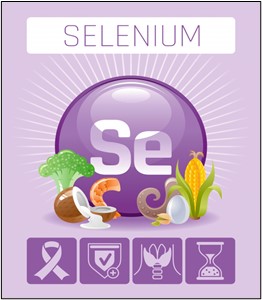Selenium is an essential trace element responsible for performing several important biochemical functions of body and required in very small amount. Basically, it exerts its beneficial effect in the form of selenoproteins and selenocompounds.
Some important information regarding selenium
- It is a nonmetallic element with the atomic number of 34 and symbol of Se
- It is considered an essential trace element for humans
- It is an important constituent of amino acids selenomethionine and selenocysteine
- Previously it was identified as an undesirable component for human body as it causes toxicity (alkali diseases) in large doses but in later it has known that selenium deficiency causes several health hazards as well. From then on it has recognized that selenium has various biological importance and should be consumed in smaller amount
- In human body it acts as a cofactor for the enzymes thioredoxin reductase and glutathione peroxidases
Sources
Foods rich in selenium are listed below –
- Chicken
- Fish
- Turkey
- Shellfish
- Eggs
- Pork
- Beef
- Ham
- Brazil nuts
- Cottage cheese
- Yogurt
- Milk
- Brown rice
- Baked beans
- Sunflower seeds
- Oatmeal
- Spinach
- Mushrooms
- Lentils
- Cashews
- Bananas


Bioavailability of selenium
- It exists in both plant and animal source in organic as well as in inorganic form
- Organic form of selenium includes selenocysteine (SeCys), selenomethionine (SeMet) and methylselenocysteine
- Whereas the inorganic forms of selenium include selenide, selenite and selenate
- Bioavailability of selenium entirely depends on its form. Basically, the organic form of selenium is comparatively more bioavailable than its inorganic form
- Some dietary factors are responsible for influencing selenium bioavailability such as consumption of Vitamin E and Vitamin A with selenium enhances its absorption. On a contrary heavy metal and fibre inhibit selenium absorption
Health benefits
Antioxidant activity
- It has strong free radical scavenging property that helps to reduce the prevalence of oxidative stress within body
- Selenium forms selenocysteine, which is an important part of glutathione peroxidase enzyme and necessary for its activation. Glutathione peroxidase helps to protect the cells from hydrogen peroxide (H2O2) damage by preventing its oxidation
- Selenium also helps to prevent lipid peroxidation and hence protects the cells from superoxide and free radicals
Anti-inflammatory activity

- Selenium exerts potent anti-inflammatory activity by inhibiting the activation of NF-kB in body, which is considered as the main controller of inflammation
- Consumption of selenium is also associated with reducing the concentration of CRP, which is considered as inflammatory marker
Role on boosting immunity
- Antioxidant and anti-inflammatory activities of selenium are responsible for enhancing immunological responses
- It is related with increasing the synthesis of WBC and T-cell
- It also helps to increase the activity of natural killer cells and functions of innate immune cells within body
Role on thyroid gland
- Selenium is found in thyroid gland in most concentrated form
- It helps to regulate the function of thyroid gland that is linked with maintaining metabolism by secreting thyroid hormones properly
- 5’-deiodinase is selenium containing enzyme helps in the conversion of thyroxine (T4) into triiodothyronine (T3) within thyroid gland
- Proper consumption of selenium helps to reduce the prevalence of several thyroid disorders such as hypothyroidism and Hashimoto’s thyroiditis (autoimmune disorder of thyroid gland)
Role on improving prostate health
- It has seen that selenium helps to reduce the susceptibility of developing prostate cancer
- It is associated with reducing the growth rate of prostate cancer cells, oxidative stress and DNA damage that help to reduce the risk of prostate cancer

Role on cardiovascular health
- It has seen that selenium plays important role in reducing oxidative stress and inflammation within body, which help to decrease the susceptibility of developing cardiovascular diseases
- It helps to reduce the prevalence of cardio inflammatory events such as thrombosis, platelet aggregation and coronary artery disease
- It also helps to enhance the health of cell lining of blood vessels that prevents clot formation and promotes proper blood circulation throughout the body
- It helps to reduce the risk of heart attacks and strokes as well
Role on nervous system
- Antioxidant property of selenium helps to prevent oxidative damages of brain cells, which is related with improving brain functions
- It is also associated with preventing inflammatory events of brain and hence promotes brain development, improves cognitive ability and memory
- It helps to reduce the prevalence of Alzheimer’s disease, Parkinson’s disease and multiple sclerosis
Other health benefits
- Selenium along with Vitamin E helps to prevent the prevalence of muscular dystrophy and hepatic necrosis
- Selenium helps to maintain the structural integrity of plasma membrane
- Selenoproteins have strong anti-carcinogenic activities and help to reduce the risk of developing cancers
- It binds with heavy metals (such as cadmium, mercury) and helps in their elimination thus, helps to protect the body from their toxic effects
- Thioredoxin reductase is an important selenoprotein helps in purine metabolism

Recent findings
- Recent researches have shown that consumption of selenium or its supplementation is beneficial for the leukocyte DNA integrity. According to this research, higher intake of methionine and lower intake of folate influence selenium activity. It has seen that selenium with mitheonine (at high extent) help to decrease hydrogen peroxide induced DNA damage (Karunasinghe et al., 2016)
- Current researches have shown that selenoenzymes are selenium containing enzymes help to protect the brain cells from oxidative damages and promotes brain functions. It plays vital role in proper brain development in fetus during pregnancy. Pregnant women who consume more sea fishes or shell fishes are prone to develop mercury toxicity as sea fishes contain contaminant methyl mercury, which prevents the transportation of selenium through placenta and inhibits the activity of fetal brain selenoenzymes. Whereas supplementation of selenium during gestation helps to preserve the activity of respective enzyme and helps to reduce the pathological consequences (Ralston et al., 2016)
Recommended dietary allowance
- Adults should consume 50 to 55 µg of selenium daily for fulfilling its requirements
- It is better to consume additional 5 to 10 µg of selenium per day during pregnancy
- Lactating women should consume 70 µg of selenium daily
- Daily requirement of selenium for children is considered as 20 µg for 1 to 3 years, 30 µg for 4 to 8 years and 40 µg for 9 to 13 years respectively

Deficiency disorders
- Keshan disease is a severe health problem caused by selenium deficiency. It is referred to as cardiomyopathy, a disease of cardiac muscle that interferes with pumping of blood throughout the body and leads to heart failure
- Pancreatic fibrosis
- Muscular dystrophy
- Reproductive disorders
- Liver necrosis
- Fatigue
Hyperactivity
Excessive consumption of selenium causes toxicity and develops severe health hazards like –
- Selenosis, which is characterized as selenium toxicity. The harmful consequences of selenosis are listed below –
-Emotional disturbances
-Hair loss
-Weight loss
-Diarrhea
-Development of garlic odor in breath (dimethyl selenide is accountable for this type of odor)
- Nausea
- Vomiting
- Fever
- Cardiovascular diseases
- Renal problems
- Hepatic disorders
- Excessive consumption of selenium supplements may increase the risk of skin cancer
- In severe condition selenium toxicity leads to death
Source:
Karunasinghe, N., Ng, L., Wang, A., Vaidyanathan, V., Zhu, S. and Ferguson, L.R., 2020. Selenium supplementation and prostate health in a New Zealand cohort. Nutrients, 12(1), p.2.
Karunasinghe, N., Zhu, S. and Ferguson, L.R., 2016. Benefits of selenium supplementation on leukocyte DNA integrity interact with dietary micronutrients: a short communication. Nutrients, 8(5), p.249.
Lay, F.P., 2018. The impact role of Selenium in human health. Women’s Health, 20, p.03.
Ralston, N.V., Ralston, C.R. and Raymond, L.J., 2016. Selenium health benefit values: updated criteria for mercury risk assessments. Biological trace element research, 171(2), pp.262-269.
Sahu, P., Prasad, P. and Bharadwj, S., 2020. Role of Selenium on Human Health–A review. Advanced Journal of Bioactive Molecules, pp.40-46.
Shreenath, A.P. and Dooley, J., 2019. Selenium deficiency. In StatPearls [Internet]. StatPearls Publishing.
Stuss, M., Michalska-Kasiczak, M. and Sewerynek, E., 2017. The role of selenium in thyroid gland pathophysiology. Endokrynologia Polska, 68(4), pp.440-465.
Tóth, R.J. and Csapó, J., 2018. The role of selenium in nutrition–A review. Acta Universitatis Sapientiae, Alimentaria, 11(1), pp.128-144.



